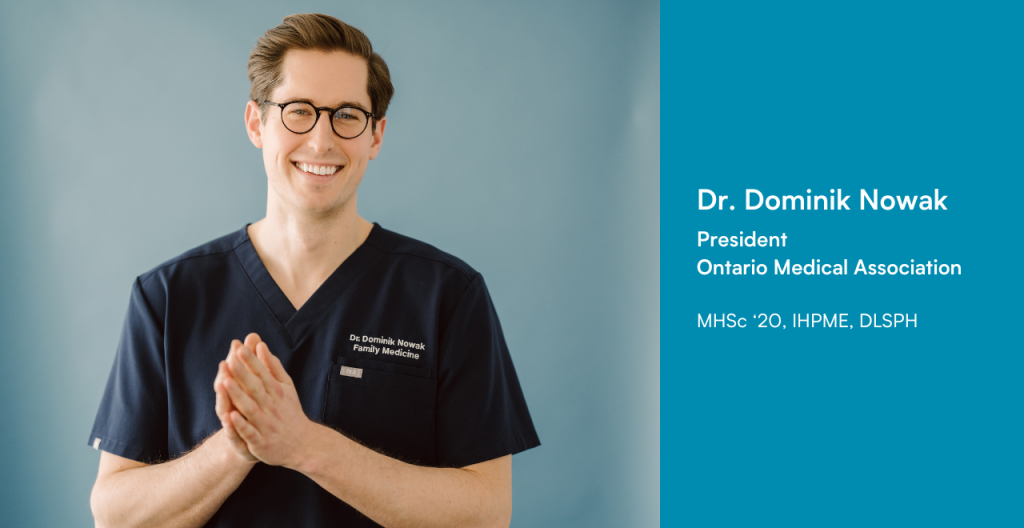DLSPH Alum Dr. Dominik Nowak Begins Term as President of OMA

Dr. Dominik Nowak, MD, MHSc, CCFP, CHE, alum of the Dalla Lana School of Public Health, began his term as President of the Ontario Medical Association on May 2, 2024. Dr. Nowak also graduated from U of T in 2013 with an HBSc and recently completed the ICD-Rotman Directors Education Program. Learn more about his involvement and future plans below!
About Dr. Nowak
Dr. Dominik Nowak is the Ontario Medical Association’s president and a family doctor at Women’s College Hospital. Dr. Nowak is a faculty member in the Department of Family and Community Medicine and the Dalla Lana School of Public Health at the University of Toronto. He is a recipient of the College of Family Physicians of Canada Award of Excellence for his leadership in Canadian health care.
After one year as President-Elect of the Ontario Medical Association, you’ve begun your term as President on May 2. What are you looking forward to most as President?
The OMA President brings the voice of Ontario’s 43,000 doctors and medical learners toward a better healthcare system. We meet with decision-makers, media, and health system advocates, but what I’m finding most meaningful is hearing the stories of physicians across the province. We know that our health system is in crisis. Too many people can’t get the care they need, and emergency departments and hospitals are overflowing. In response, so many of our colleagues are stepping forward with solutions to create a better future for patients in Ontario—a key part of my job is to support them, amplify their stories, and advocate for those solutions to spread and scale.
What drew you to pursue studies at IHPME at DLSPH and what impact did that decision have on you?
When I finished my specialty training in family medicine at McMaster and started practice, I also set out looking for my next challenge. IHPME and DLSPH stood above in that our faculty are involved at all levels of health systems advocacy and decision-making. It was electrifying to me to learn directly from the leaders investing their careers into building a better health system. Now, I think of my own work in systems leadership and the responsibility we have to pay it forward in teaching the next generation of health change-makers.
What is one of your greatest memories of your time at DLSPH?
The finish line! In reality, the start of the COVID-19 pandemic coincided with our cohort’s last moments together in class, moments of fear and awe of what was to come. It was a difficult time for everyone in society, and we had no idea of what was to await us in the subsequent years. Especially after learning together for two years, however, it was also enormously inspiring seeing so many of our classmates andfaculty take up significant leadership roles that contributed to lifesaving efforts. It was truly special to run into former classmates and faculty who were contributing in such meaningful ways at a time of chaos and uncertainty.
How do you like to stay engaged with DLSPH as an alum and why is that important to you?
There is so much difficulty and challenge ahead of us in health care right now. To create a health-care system that can make Canadians proud again—we’ll need to act with impatience, courage, and relentless optimism. A sense of community will help us persevere through the enormous challenges ahead. That is why I like to stay involved, to contribute to that supportive professional community both for fellow health systems leaders, as well as in my faculty role for emerging health system change-makers.
Do you have any future plans you would like to share or are there any particular projects or initiatives you are working on you would like to share?
I’m focused on advocating for a health-care system that can once again be a source of pride for Canadians. Right now, one in five people can’t find a family doctor, that’s soon to be one in four. Hospitals and emergency rooms are overwhelmed. Meanwhile, 2.3 million people in Ontario have no other choice than to use the emergency room as their front door to the health-care system. We’re actively putting forward systems-changing proposals that would rebuild our health-care system, and finally get people the care they need.
Do you have any tips for new grads?
Get to know your classmates and your faculty. Be kind to one another, find ways to show up for each other even in day-to-day ways. It can be both meaningful and difficult working in health care. That sense of community, of being a source of support for one another, is a big part of what brings joy in work to many of us working hard to get our health system back on track.
Published June 21, 2024
